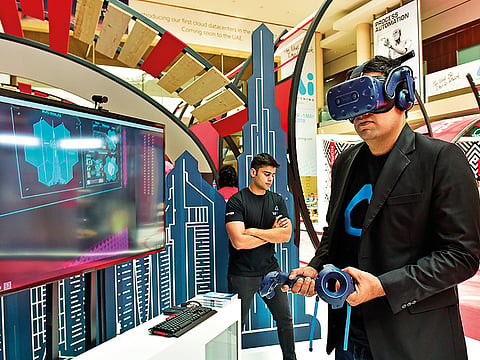Augmented edges virtual as battle for realities heats up
Commercial space seen helping VR overcome challenges of costly headsets and limited content

Dubai: Augmented reality (AR) is witnessing faster gains than virtual reality (VR) in the region due to easy-to-use AR-enabled smartphone apps developed to access the content, industry experts have said.
Nabila Popal, senior research manager at research firm International Data Corporation (IDC), said expensive headsets and limited content availability had left VR hamstrung.
“VR headsets are estimated to have a steady growth as the market still struggles with low-cost headsets with limited ‘use cases’. Headsets like HTC and Oculus are still struggling with high-price products yet to be adopted by the mass market, especially with limited content available,” she said.
But, she said that there is a huge potential for it in the commercial space, and that is where the real boom in this technology will come from, as use cases across different industries and the adoption rate are expected to grow, driving shipments across the region.
Ramit Harisinghani, vice-president and head of the Middle East and Africa at HTC Vive, said that content and opportunity have been some of the most challenging aspects for VR.
“We have the Vive Port apps store where a developer can come onboard with a revenue-sharing model and Vive Studios that help in education, mentoring, publishing and go-to-market strategy. There [is a] lot of gaming content in VR available but enterprises such as VW are using VR for training. As and when the enterprises come onboard, the VR ecosystem will gain momentum,” he said.
HTC launched a wireless adapter for HTC Vive that delivers an untethered experience.
HTC’s Vive Port has more than 1,600 apps and Harisinghani said that more local content developers are coming in.
Easy to implement
“AR is a lot easy to implement while VR has an endless amount of opportunities. But the experience you get from a VR is unmatched by AR. Consumer and gaming will pick up in VR while applications in health care, education, government and retail will pick up when enterprises come onboard,” he said.
Kafil Merchant, a research analyst at IDC, said that VR hardware developers have been focused on solving common problems currently faced by the industry.
However, he said a major concern with this technology is user protection, which includes motion sickness.
“Consumers are excited with this technology reaching new milestones as different industries slowly penetrate and capitalise to become the early adopters of the virtual world,” he said.
Currently, gaming has a significant share for VR — as witnessed with the launch of the Emaar VR Park earlier this year at the Dubai Mall’s 75,000 square metres of space dedicated only for VR gaming, which appeals to the younger generations a lot.
However, Merchant said that investments in VR are being done across other specific verticals.
“Start-ups with private and government initiatives are working closely to implement VR across verticals like education, health care and real estate. A good place to see all the interesting projects and use cases is in Dubai Future Accelerators, which showcases many of these upcoming uses and projects,” he said.
According to the research firm, the industry is expected to grow with a steady pace, with significant growth expected by 2020 and 2021.
Popal said that growth in VR adoption is expected to come from sub-segments like training, automation, marketing, entertainment and many more.
“AR with a slightly better edge is the [one offering] easy access over a smartphone, which is gaining more popularity and giving a user-friendly experience,” she said.
The challenges the VR industry is facing, she said, include new or user-friendly content and a lack of product demonstration. However, it is anticipated that the ‘Smart City 2021’ government project would have a major impact on the VR market and foster substantial growth and demand.



